
Extreme cold, ice, freezing rain, snow and high winds are all part of winter storms. It’s never too early to plan for rough winter weather. Follow the tips below to get started on your winter storm preparedness plans.
Basic Tips
- Review current or unexpected medical needs of you and your family. Store at least three days’ worth of prescription medication for chronic health conditions, and include battery backups for electronic devices.1
- Don’t forget to make plans for your pets, too.2 Bring pets into a warm, dry place out of the storm and severe cold. Keep a three days’ supply of food, water and medications for them.
- Sign up for local alerts and warnings. Download the free FEMA or American Red Cross apps, which can be found in your app store. These apps have information such as the location of local shelters, first aid tips, and assistance for recovery.
Emergency Planning
- Make sure you have everything you will need to get in touch with your family through cell phones, email or social media.3
- If your home is damaged or has lost power, consider going to a designated public shelter. Text SHELTER + your ZIP code (for example, SHELTER 20472) to 43362 (FEMA) to find the nearest shelter in your area, and follow local media for information.4
Health Concerns:
- If you must go outdoors, wear several layers of loose-fitting, lightweight, warm clothing. The outer garments should be water-repellent. Wear mittens, which are warmer than gloves, and protect all of your body including a hat and scarf.
- Use caution, take breaks, push the snow and lift lighter loads when shoveling.
- People who go outside may also suffer from frostbite, caused by exposure and lack of protection from wind and cold. Signs include white or grayish-yellow skin area, skin that feels unusually firm or waxy, and numbness. If you detect symptoms, cover exposed skin and seek medical attention immediately.5
- Hypothermia occurs when the body temperature drops to dangerously low levels. Signs of hypothermia include uncontrollable shivering, exhaustion, disorientation or memory loss, incoherence, slurred speech, drowsiness, and loss of feeling in the face. Seek medical attention immediately.
- Keep battery-operated carbon monoxide detectors or electric detectors with battery backups in central locations on every level of your home. If the carbon monoxide alarm sounds, move outdoors quickly or to an open window or door. Call or text 911 and remain outside until emergency personnel arrive.6
Traveling by Car
- During a storm, stay indoors and off the roads, driving only if necessary.
- Clean all snow and ice from your car before driving, remove snow and ice from your tailpipe before starting your car, and check these areas regularly if idling.
In Your Home
- Dress in layers and use blankets to stay warm.
- Close off rooms to consolidate heat.
- Never heat a home with a cooktop or oven.
- Keep fire extinguishers in your home and make sure everyone knows how to use them.
- Place any important documents, such as insurance paperwork, in a sealed, waterproof container that is easily accessible.
The Importance of Insurance
- Review your homeowners, renters, or business insurance policies before a storm strikes to ensure you have appropriate coverage.
- If you need more information or new or additional coverage, find an independent insurance agent to speak with about options that work best for your needs.
- Photograph and inventory your property now to assist with post-disaster claims.
- If you suffer damage, file a claim as soon as possible, and do what you can to prevent further damage, such as putting a tarp on a damaged roof if you’re able to safely reach it.
*This article was originally published December 15, 2020
Sources:
1, 6. FEMA, Winter Storm.



